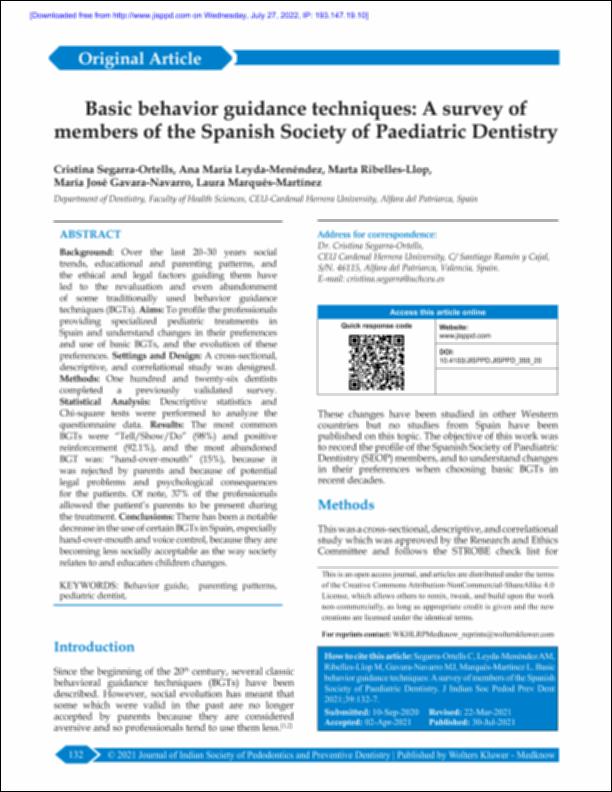Por favor, use este identificador para citar o enlazar este ítem:
http://hdl.handle.net/10637/14159Basic behavior guidance techniques a survey of members of the Spanish Society of Paediatric Dentistry
| Título : | Basic behavior guidance techniques a survey of members of the Spanish Society of Paediatric Dentistry |
| Autor : | Segarra Ortells, Cristina Leyda Menéndez, Ana María Ribelles Llop, Marta Gavara Navarro, María José Marqués Martínez, Laura |
| Materias: | Odontología infantil.; Pedodontics.; Padres - Conducta.; Dentists behavior.; Odontólogos - Conducta.; Parents behavior. |
| Editorial : | Wolters Kluwer |
| Citación : | Segarra-Ortells, C., Leyda-Menéndez, A. M., Ribelles-Llop, M., Gavara-Navarro, M. J. & Marqués-Martínez, L. (2021). Basic behavior guidance techniques: a survey of members of the Spanish Society of Paediatric Dentistry. Journal of the Indian Society of Pedodontics and Preventive Dentistry, vol. 39, i. 2 (apr.-jun.), pp. 132–137. DOI: https://doi.org/10.4103/JISPPD.JISPPD_355_20 |
| Resumen : | Background: Over the last 20–30 years social trends, educational and parenting patterns, and the ethical and legal factors guiding them have led to the revaluation and even abandonment of some traditionally used behavior guidance techniques (BGTs). Aims: To profile the professionals providing specialized pediatric treatments in Spain and understand changes in their preferences and use of basic BGTs, and the evolution of these preferences. Settings and Design: A cross‑sectional, descriptive, and correlational study was designed. Methods: One hundred and twenty‑six dentists completed a previously validated survey. Statistical Analysis: Descriptive statistics and Chi‑square tests were performed to analyze the questionnaire data. Results: The most common BGTs were “Tell/Show/Do” (98%) and positive reinforcement (92.1%), and the most abandoned BGT was: “hand‑over‑mouth” (15%), because it was rejected by parents and because of potential legal problems and psychological consequences for the patients. Of note, 37% of the professionals allowed the patient’s parents to be present during the treatment. Conclusions: There has been a notable decrease in the use of certain BGTs in Spain, especially hand‑over‑mouth and voice control, because they are becoming less socially acceptable as the way society relates to and educates children changes. |
| Descripción : | Este artículo se encuentra disponible en la página web de la revista en la siguiente URL: https://journals.lww.com/jped/Fulltext/2021/39020/Basic_behavior_guidance_techniques__A_survey_of.4.aspx |
| URI : | http://hdl.handle.net/10637/14159 |
| Derechos: | http://creativecommons.org/licenses/by-nc-sa/4.0/deed.es |
| ISSN : | 0970-4388 1998-3905 (Electrónico) |
| Fecha de publicación : | 15-abr-2021 |
| Centro : | Universidad Cardenal Herrera-CEU |
| Aparece en las colecciones: | Dpto. Odontología |
Los ítems de DSpace están protegidos por copyright, con todos los derechos reservados, a menos que se indique lo contrario.


